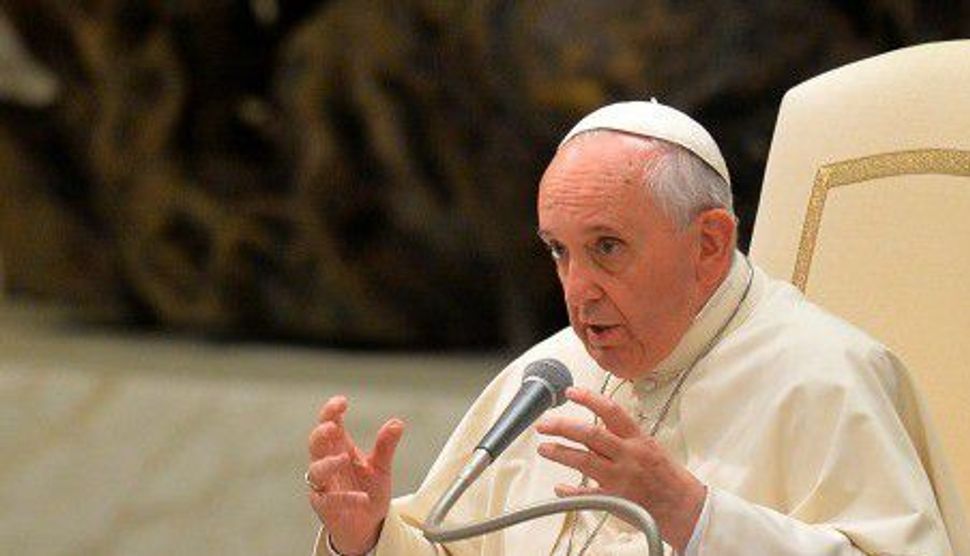Why it matters that the pope has his own Netflix show
Why would the pope — who hasn’t watched TV in over 20 years — have a Netflix show?

Image by Getty Images
Religion is evolving to become more tech-friendly. Facebook added a prayer feature. Zoom minyans have become the norm for many. And the pope had launched a Netflix show.
Yes, we’re talking about the real pope here, not one of the several fictionalized shows about the pontiff. Pope Francis is hosting a Netflix show.
“Stories of a Generation,” which consists of four episodes, highlights four values: Love, Dream, Struggle and Work. Based on a similarly structured 2018 book from the pope, each episode shares related stories that highlight one of those values from a handful of people from around the world – some famous, such as Martin Scorsese and Jane Goodall, others less well-known, such as Jerusalem-based chef Moshe Basson or a Vietnamese cobbler. In between, Pope Francis reflects on those same virtues, talking about the holiness of the midwife who delivered him and his siblings or lessons of tenacity he learned from a washerwoman.
The different stories are spliced together in a way that can make them hard to follow, and it’s a bit of a slow watch. Still the show is intriguing nonetheless; each snippet of Pope Francis pontificating (sorry) made me wonder what, exactly, he’s trying to accomplish by diving into the world of streaming.
Religious leaders taking on the small screen is nothing new; televangelists are a well-established phenomenon. And of course, major papal addresses have been broadcast on TV since Pope Pius XII’s Easter speech in 1949; NBC has broadcast the Vatican’s Christmas midnight mass for decades. But Pope Francis is far from the pastors who stride across stages, preaching the prosperity gospel; his is a dignified, storied position that often holds itself above the more profane churn of pop culture. And “Stories of a Generation” isn’t really about preaching or conversion or even, at least overtly, about Christianity. So what is it about?
Professor Diane Winston, who teaches media and religion at the University of Southern California’s Annenberg School of Communications, pointed out when we spoke on the phone that Francis has made a big effort to reach the “unchurched” in addition to committed Catholics.
“The only other religious leader who I can think of who actually has a worldwide following is the Dalai Lama. We Jews don’t have any titular head of Judaism, Muslims don’t really have a titular head of Islam, same with Hindus,” Winston said. “But both the pope and the Dalai Lama have established themselves as authentic spiritual figures who, even if you aren’t part of their tradition, you know that they have a message that is more for the world than just for their own community.”
Part of this has been Francis’s accessibility; he’s been called the pop-culture pope, known for a willingness to take selfies with fans and his active Twitter presence (which he has at times used to subtweet Trump). While Winston pointed out that Benedict XVI, Francis’s predecessor, actually started the papal Twitter account, he kept his tweets very formal, largely exhortations about behavior or scripture. Francis, on the other hand, has leaned into the medium, using the casual language of the platform, and from that perspective, it’s not surprising that he’s taken to Netflix as well.
Still, the pope isn’t truly engaged in the world of social media and pop culture. In fact, he hasn’t even watched TV since 1990, though a Swiss Guard keeps him updated on his favorite soccer team, the Argentine club San Lorenzo. He doesn’t even write those savvy tweets himself. So why jump into the morass of streaming culture?
“I think the pope sees himself as head of the Roman Catholic Church, but I also think he sees himself as someone who is in a very privileged position of being able to talk to everyone,” said Winston. “And not to convert them, but to remind them what it means to be a good human being. I think that’s something that other popes have felt, but this pope maybe feels it more strongly, or sees ways to act on it that other popes didn’t.”
Usually, there’s not much appeal in turning to a religious leader for moral input when you don’t believe in the tenets of the faith they preach. But Francis has developed a reputation as the people’s pope, notably forgiving of laymen for a wide variety of sins and open-minded to a number of progressive ideas traditionally at odds with Catholicism. He’s also known for being harsh with his bishops and cardinals, criticizing their clericalism, bureaucracy and gossiping; he wants the focus to be on global issues such as poverty rather than the intricacies of dogma or theology, the kind of pedantic details that have historically driven people away from Catholicism.
This too makes the move toward Netflix less surprising; he isn’t concerned about what is and isn’t appropriate or dignified enough for a pope, and famously rejected the sumptuous robes and housing of the office when he entered it. Even if he doesn’t watch TV, Francis clearly has his finger on the pulse enough to understand the ways we source our knowledge and entertainment today, and is more concerned with effective communication than decorum. “Stories of a Generation” has a clear message the pope is trying to transmit through a medium he knows young people use regularly.
Winston also pointed out that the Church has been among the first to pick up many technologies in the past – going back to the printing press. But the professor doubted any other religious leaders could follow suit and try a similar sort of outreach; networks don’t want to stray into potential religious controversy.
Besides, even in the extremely unlikely event the Satmar Rebbe would want his own show, Netflix probably wouldn’t want him; his name recognition just isn’t high enough.

















